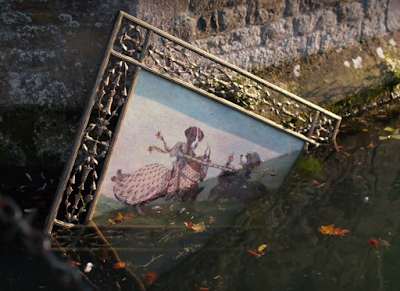Read the next entry here!
Communications break down to some degree, and a new twist kinks the tapestry of the narrative, as the second season of Galavant continues.
2.2, "World's Best Kiss"
Written by Kat Likkel, John Hoberg, Luan Thomas, Julia Grob, and Joe PiarulliDirected by John Fortenberry
Synopsis
 |
| It seems a rather pointed remark. Image taken from the episode, used for commentary. |
 |
| At least Galavant got his name right... Image taken from the episode, used for commentary. |
Galavant and Richard arrive at a festival in progress. Galavant takes Richard's boots to get them repaired and leaves Richard to amuse himself in the fair. Richard soon espies a unicorn that is strangely attracted to him. He is chagrined to learn that unicorns are attracted to virgins. Later, he and Galavant confer about the kiss the latter shared with Isabella and suggests visiting a fortune teller. The fortune teller confers with the two in overly dramatic and juvenile fashion until interrupted by a call from home. He apologizes for the call, but the two seize upon the idea of using it for their own ends.
Isabella tries to make her escape, aided by Steve amid a game of hide-and-seek. The guard-changing ceremony is indeed ludicrous, and it provides cover for the escape attempt. But the amulet Isabella had entrusted to Vincenzo receives a call from Galavant and Richard--with bad call quality. Richard learns of events in Valencia, which wounds him. Galavant bids Vincenzo find Isabella, and Richard continues to mull over his hurts.
 |
| Not the kindest criticism, no. Image taken from the episode, used for commentary. |
In Hortencia, Vincenzo convenes with Isabella, allowing Galavant to connect the call. The poor call quality occasions substantial miscommunications on both their ends. Galavant is buoyed and Isabella heartbroken. She returns to her captivity, seemingly willingly.
Richard continues to consider his circumstances, pursued by the unicorn. He arrives at a resolution and takes up a nearby sword. Galavant apologizes to Richard, and the two commiserate briefly before getting back underway, only to find things are greatly changed.
 |
| Not that the sword Richard pulled matters or anything... Image taken from the episode, used for commentary. |
Discussion
Notable in the episode is Richard's description of the festival as a "pre-Renaissance pleasure fest." Festivals in the medieval were occasions of no small import, of course, both for the commemorations of those things noted as the formal reasons for them and for the relaxation of and from social norms and daily tasks that they occasioned--not unlike festivals today. The medieval had no concept of being a middle age, though, or of a purported renaissance to come, so the term is anachronistic--as befits a treatment of those things upon which the joke rests, Renaissance fairs, about which (and similar things) I've written more than once.Additionally, and more in line with medieval antecedents, the festival features a unicorn and a sword needing pulling from a fixed location--a stump in the present instance. The Arthurian associations of the latter are clear, so much so that they hardly need explication. (That they connect to Disney's 1963 Sword in the Stone more than to Malory is perhaps the only item needing more explanation. Given that Galavant is an ABC property, and ABC a Disney property, it is sensible enough. The unwitting, almost childlike nature of the pull is more pronounced in the animated presentation and the present episode than in Malory or other "more serious" works. But with Richard suddenly associated with Arthur through drawing the sword, his naïvete suddenly becomes more solidly grounded; Arthur is, after all, described as "sumquat childgered" in Sir Gawain and the Green Knight.)
Unicorns are prevalent in popular culture, to be sure. (My Little Pony: Friendship Is Magic, anyone?) They are commonplaces in fantasy properties, typically understood to be associated with purity. Their attraction to it is powerfully suggested in such works as the Unicorn Tapestries, and reading them as sexual metaphors is hardly difficult. The depiction of the unicorn in the present episode seems to line up with medieval depictions rather neatly, even if it is put to use in anachronistic humor that appears to align to concepts of toxic masculinity that should be overthrown.
(I am aware that the present episode, as well as several others, work to make Richard a more sympathetic character, in part through highlighting the tension he experiences in trying to reconcile the toxic masculinities he is "supposed" to uphold and his own seemingly gentler nature. But he has also in the series been a bad ruler, a kidnapper, an invader, borderline genocidal, and any number of other undesirable things. The weekly broadcasts and season-schedules of the original airings might have done something to mute recollection of such things, but the streaming services where the series is most easily viewed now do not, and streaming does not serve to foster a good image either of Richard or of an audience that might be willing to forget quickly the horrors he has perpetrated.)
*I had the chance to use "defenestration" in a sentence. I had to take it. Had. To.

No comments:
Post a Comment